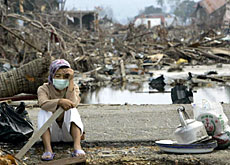ICRC calls for united tsunami relief effort

The International Committee of the Red Cross (ICRC) says one of the biggest challenges facing the global community is the coordination of tsunami relief efforts.
World leaders and aid workers met in Jakarta on Thursday to discuss how to deal with the aftermath of the worst natural disaster in decades.
Summit participants welcomed the idea of debt relief for countries hit by the disaster, and supported the creation of a tsunami early warning system.
The Swiss-run ICRC hoped that the donor summit would facilitate the allocation of billions of dollars in aid for the survivors of the December 26 tsunami, which killed an estimated 150,000 people and left millions homeless.
“The main problems are the scale of the catastrophe and the damage done to infrastructure, such as communications and transport, which hinders the aid effort,” said Ian Piper, the ICRC’s senior media relations officer.
“Coordination is a major challenge now that there is a clearer assessment of needs throughout the region,” he told swissinfo.
Switzerland did not take part in the Jakarta summit but Swiss officials are expected to attend a follow-up donor conference in Geneva next week.
Devastation
About SFr4.7 billion ($4 billion) has already been pledged from around the world to help the victims of the tsunami, which struck coastlines from southern Asia to Africa.
Hospitals, airports, railways and roads were wiped out in many places, making it extremely difficult to reach remote areas.
In addition, the vast number of aid organisations working in Asia, along with the huge quantity of donations and relief supplies, are beginning to pose organisational problems.
The ICRC says some parts of Sri Lanka have a surplus of aid, while others do not have enough.
“The coordination of aid must be based on proper assessments and the sharing of information to determine who needs the most help and who is best placed to offer assistance,” said Martin Unternaehrer, the ICRC’s spokesman in Indonesia.
“The show of solidarity has been amazing, but along with massive aid comes massive pressure on humanitarian organisations to make good on their promises to help,” Unternaehrer told swissinfo.
Reconstruction
Apart from coordination issues, participants at the Jakarta summit also discussed long-term reconstruction efforts and disaster prevention.
On Wednesday the ICRC and the Geneva-based Federation of Red Cross and Red Crescent Societies announced that SFr650 million would be needed over a five-year period to rebuild the shattered lives of millions of people across southeast Asia.
Susan Johnson, the Federation’s director of operations, described the catastrophe as the “most devastating natural disaster in modern times”.
She added that the scale of the devastation required the world’s humanitarian agencies to act “quickly, effectively and with a long-term perspective”.
swissinfo, Anna Nelson in Geneva
Thursday’s summit in the Indonesian capital, Jakarta, focused on how best to allocate the billions of dollars in aid pledged after the tsunami disaster.
World leaders supported the idea of an early warning system to prevent massive death tolls from future tsunamis.
An estimated 150,000 people were killed and millions made homeless by the December 26 tsunami.
The ICRC is currently focusing its relief efforts on Sri Lanka and the Indonesian province of Aceh – two of the regions hardest hit by the tsunami.
The Swiss-run agency is a neutral humanitarian organisation that was founded in 1863 and works to provide food, water and medical assistance to those in need.

In compliance with the JTI standards
More: SWI swissinfo.ch certified by the Journalism Trust Initiative











You can find an overview of ongoing debates with our journalists here . Please join us!
If you want to start a conversation about a topic raised in this article or want to report factual errors, email us at english@swissinfo.ch.